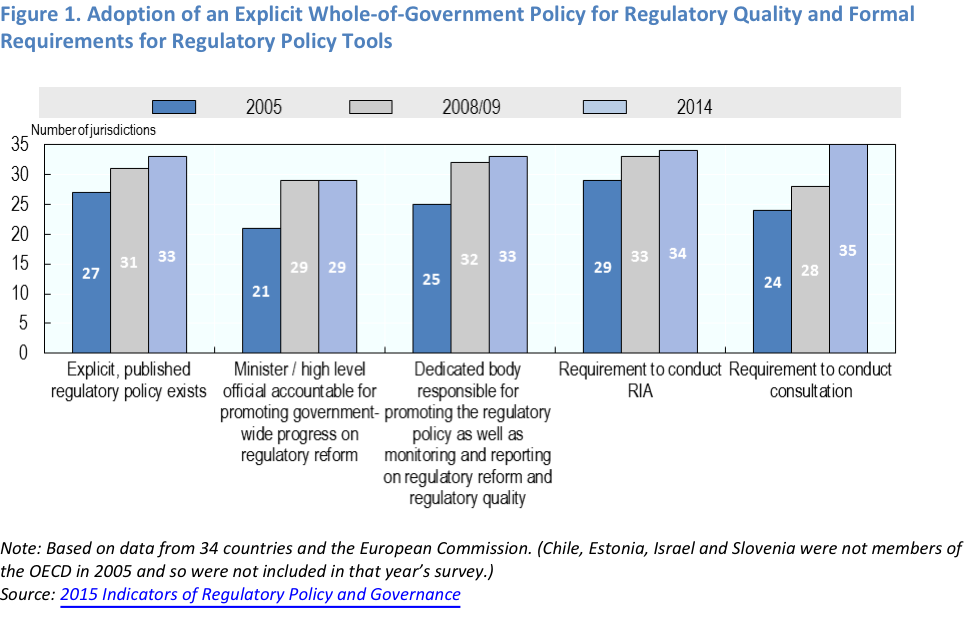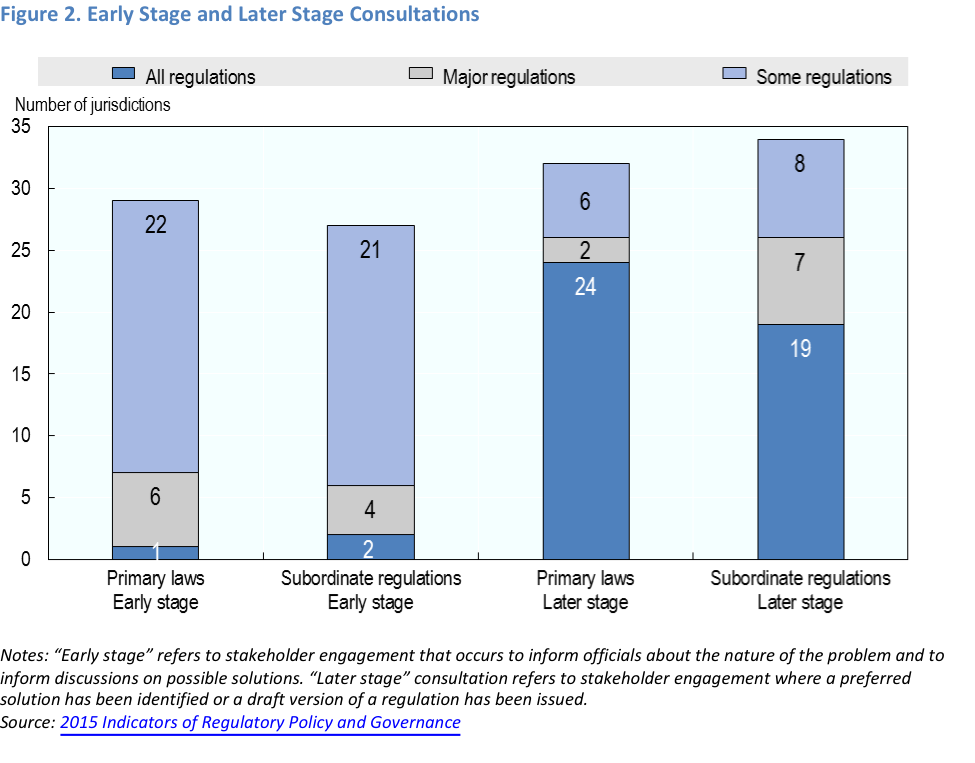
A recent OECD Regulatory Policy Outlook sketches the present and future of OECD countries’ regulatory policy practices.
Regulation is a critical tool in the hands of government to support economic growth and well-being. However, it is often overlooked, with many governments focusing almost all of their energy instead on designing their tax and spending policies. We often hear how politicians raise or reduce taxes or boost or curb public spending to achieve their policy objectives, but only rarely do we hear that they pay attention to the way they develop and enforce regulation. Largely, we take for granted the rules that determine our safety and lifestyle and the playing field of our companies. Yet we should not ignore regulation. When poorly conceived, government rules can result in unintended consequences, excessive costs, or both. Worse, they may not even serve their intended purposes of protecting the public or boosting economic activity.
 The OECD Regulatory Policy Outlook is the first effort to date to track systematically the progress being made by Organization for Economic Co-operation and Development (OECD) countries toward improving the ways they develop, implement, and review their laws and regulations. The Regulatory Policy Outlook came out last fall, just three years after the adoption of the OECD Recommendation on Regulatory Policy and Governance, a comprehensive and aspirational international standard on how to promote regulatory quality. The Regulatory Policy Outlook builds on a comprehensive and unique dataset of law-making – the 2015 Indicators of Regulatory Policy and Governance (iREG) – and showcases state-of–the-art regulatory policy practices as of December 2014.
The OECD Regulatory Policy Outlook is the first effort to date to track systematically the progress being made by Organization for Economic Co-operation and Development (OECD) countries toward improving the ways they develop, implement, and review their laws and regulations. The Regulatory Policy Outlook came out last fall, just three years after the adoption of the OECD Recommendation on Regulatory Policy and Governance, a comprehensive and aspirational international standard on how to promote regulatory quality. The Regulatory Policy Outlook builds on a comprehensive and unique dataset of law-making – the 2015 Indicators of Regulatory Policy and Governance (iREG) – and showcases state-of–the-art regulatory policy practices as of December 2014.
The Regulatory Policy Outlook conveys good news: over the past two decades, OECD countries have come a long way towards establishing conditions for better regulatory quality. These countries now show a widespread commitment to regulatory quality: 33 OECD countries have adopted an explicit regulatory policy, 29 have a designated minister or high-level official responsible for strengthening government-wide regulatory policy, and 33 have established a standing body charged with regulatory oversight. At the same time, governments’ law-making activities are becoming more accountable and evidence-based through increased use of impact evaluation and more systematic stakeholder engagement. In all but one OECD country, Regulatory Impact Analysis (RIA) and consultation have become formal requirements for the executive branch in the development of new regulations, as shown in Figure 1.
 But the Regulatory Policy Outlook also tells us that much remains to be done to ensure that the right rules are designed in the right way and by the right kind of people, so that they may achieve the right results. Stakeholder engagement should be thoroughly integrated into each step of the regulatory governance cycle. In particular, stakeholders should be more systematically involved at an early stage when identifying a policy problem and its possible solutions to ensure meaningful inputs into the rule-making process.
But the Regulatory Policy Outlook also tells us that much remains to be done to ensure that the right rules are designed in the right way and by the right kind of people, so that they may achieve the right results. Stakeholder engagement should be thoroughly integrated into each step of the regulatory governance cycle. In particular, stakeholders should be more systematically involved at an early stage when identifying a policy problem and its possible solutions to ensure meaningful inputs into the rule-making process.
At present, typical engagement takes place at a later stage in the development process when the preferred solution has been identified already or even after a draft of the regulation has been issued, as shown in Figure 2. Currently, only 12 jurisdictions release RIAs for consultation with the general public. Although the majority of OECD countries have established oversight bodies reviewing the quality of RIAs, in a significant number of cases these bodies are not able to return RIAs for revision. This raises questions as to how effectively they are fulfilling their role as gatekeepers to guarantee regulatory quality. OECD countries would do well to pursue stronger stakeholder engagement in the development of RIAs, taking steps to make the RIA process more transparent and open to public input.
 Regulators also need to focus their attention on implementation and evaluation of regulation. Too often, most of regulators’ energy is spent on regulatory design. The Regulatory Policy Outlook reveals that one-third of OECD countries lack a regulatory compliance and enforcement policy, and only one country in four requires systematic evaluation of primary laws once they are in use. The impact of regulation could be further improved by addressing shortcomings in implementation and enforcement and by evaluating systematically whether the objectives of regulation have been achieved. On this, governments should not do it alone or act in isolation. Improving regulatory quality is a task that goes beyond the efforts of the executive branch and that should leverage the important part that other institutions, parliaments, sub-national levels of government, and regulatory agencies in particular, can play. New approaches, such as those based on behavioural economics, may also help foster more effective laws and regulations.
Regulators also need to focus their attention on implementation and evaluation of regulation. Too often, most of regulators’ energy is spent on regulatory design. The Regulatory Policy Outlook reveals that one-third of OECD countries lack a regulatory compliance and enforcement policy, and only one country in four requires systematic evaluation of primary laws once they are in use. The impact of regulation could be further improved by addressing shortcomings in implementation and enforcement and by evaluating systematically whether the objectives of regulation have been achieved. On this, governments should not do it alone or act in isolation. Improving regulatory quality is a task that goes beyond the efforts of the executive branch and that should leverage the important part that other institutions, parliaments, sub-national levels of government, and regulatory agencies in particular, can play. New approaches, such as those based on behavioural economics, may also help foster more effective laws and regulations.
Now is the time for action. Despite the strong commitment of OECD countries to regulatory quality, there still remains a gap between the vision and the reality of effective regulation. Investing in better regulation can result in significant cost savings for businesses as well as achieve more effective outcomes. OECD estimates show that millions of dollars were saved in Australia and the US by reducing the occurrence of bad regulations. The German government estimates savings of 12 billion euros for business since 2006 through the evaluation of regulations. The demands on regulators – and on governments more generally – are at a historic high. OECD’s Regulatory Policy Outlook and its Recommendation on Regulatory Policy and Governance provide countries with the tools needed to move forward on an agenda of regulatory improvement and to help monitor progress towards achieving more inclusive growth and effective public governance.
Christiane Arndt, Faisal Naru, Rebecca Schultz, and Daniel Trnka of the OECD Regulatory Policy Division also contributed to this post.





